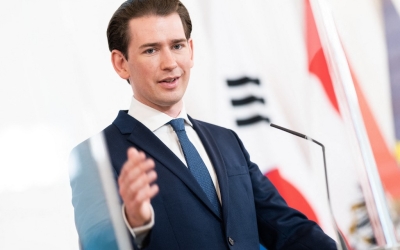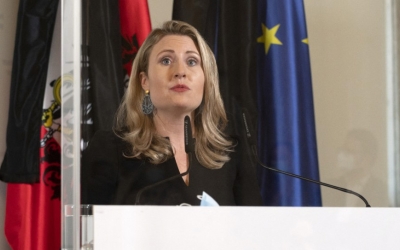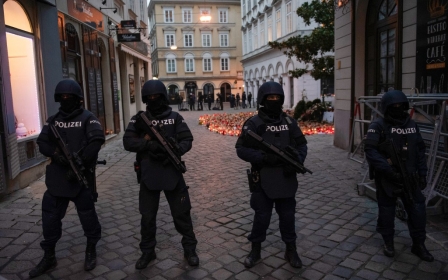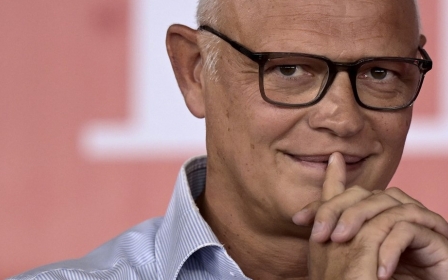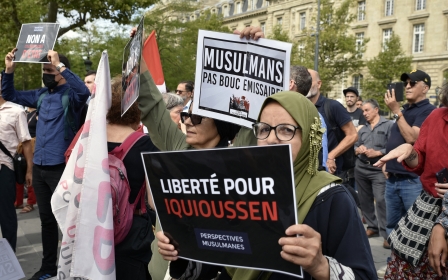The Austrian state's attack on Muslims shows no sign of easing
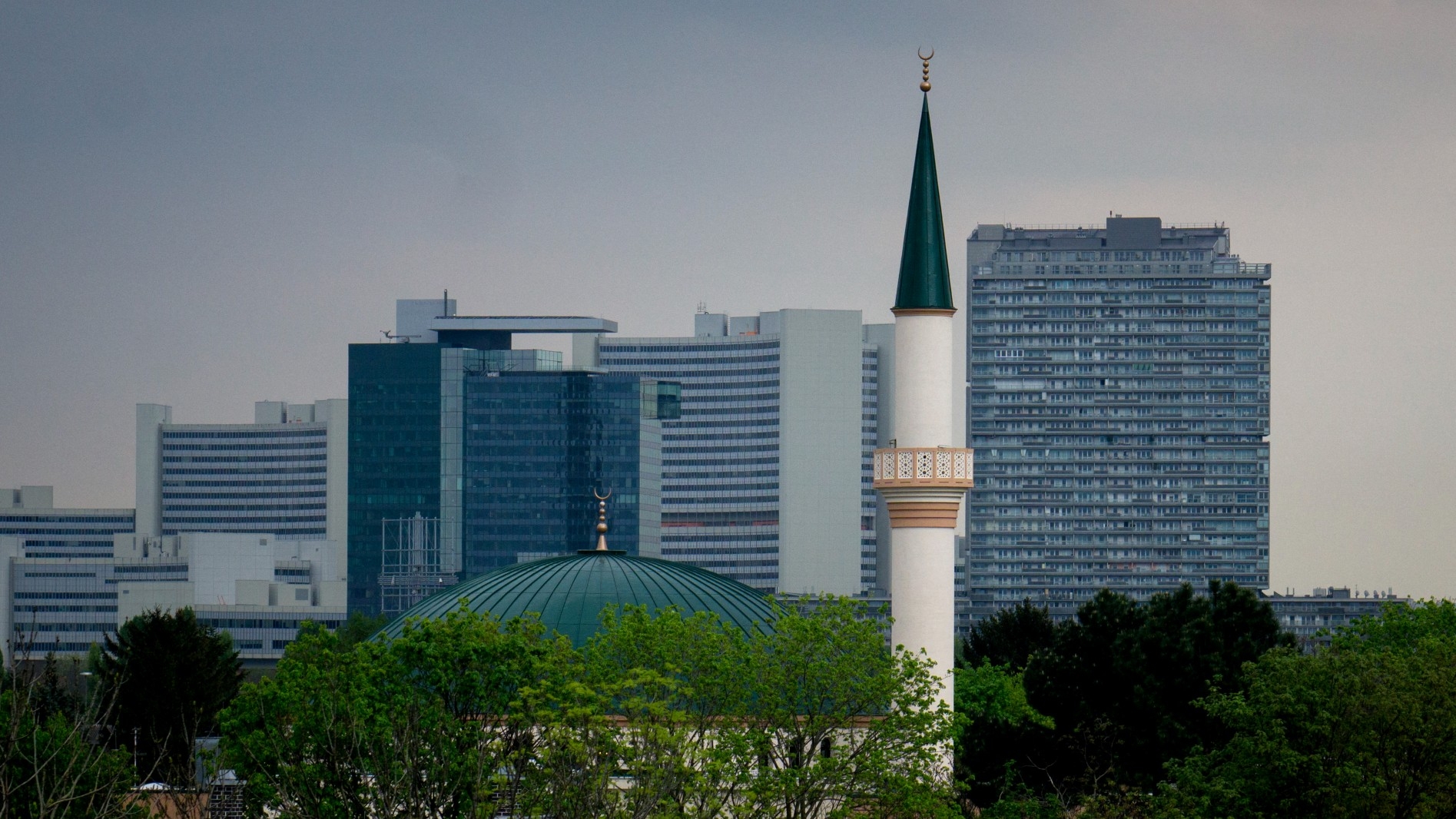
On 9 November 2020, seven days after a gunman in Vienna had shot dead four people, Austrian police carried out a substantial operation targeting individuals and organisations in its Muslim civil society, including aid organisations such as Rahma Austria and Muslim associations operating mosques, in what has become known as the infamous Operation Luxor.
It was a large-scale police operation involving 940 officers targeting more than 70 individuals and organisations.
Two days later, Lorenzo Vidino, director of the programme on extremism at George Washington University, argued in a piece for Foreign Policy that "Austria, not France, is the model for Europe's crackdown on Islamists".
In the article, Vidino praised the then-Austrian chancellor, Sebastian Kurz, for being ahead of French President Emmanuel Macron, who had been similarly draconian in his crackdown on what the French government had coined "Islamist separatism".
New MEE newsletter: Jerusalem Dispatch
Sign up to get the latest insights and analysis on Israel-Palestine, alongside Turkey Unpacked and other MEE newsletters
Indeed, both Macron and Kurz sang from the same hymn sheet, pretending to protect the large group of "peaceful Muslims" from the dangerous few, the organised ones, members of what the French and Austrian governments called "Islamist separatism" or "political Islam".
In reality, this meant that public signs of Islam, political participation, and the fight against Islamophobia would be criminalised. Both the French and the Austrian governments cracked down heavily on what they called the "enablers of terrorism" and praised their own initiatives as successful measures in the fight against the said threat.
Over three years later, nothing could be more wrong: Austria's political leadership became lost in its hyper-anti-Muslim populism just to threaten Muslims' civil rights, freezing assets and bank accounts of individuals and associations and thus destroying their livelihoods based on literally no evidence.
Austria was not always like this - in fact, quite the opposite.
For decades, Austria prided itself on its relatively tolerant integration of Muslims. Drawing on the long existence of a legal framework dating back to the Austro-Hungarian monarchy's Islam Act of 1912, which helped create conditions for integrating people of Muslim faith into society unparalleled in Europe, Muslims were able to establish associations that were - at least theoretically - on an equal footing with other small minority churches and denominations such as Protestantism and Judaism.
Livelihoods destroyed
This largely changed with the rise to power of Kurz, who became leader of the Austrian People's Party (OVP) in May 2017 and then chancellor of Austria in December that same year.
On an electoral level, this happened largely with the help of cultivating anti-Muslim sentiment that had predated his coming to power and which he refashioned in a manner that was more acceptable to the electorate.
Once in power, Kurz abolished the Islam Act of 1912 and created a new one: the Islam Act of 2015. The new legislation put Muslims under scrutiny and surveillance in a way that no other legally recognised church or denomination had to face and imposed discriminatory practices and measures targeting the Muslim community.
For example, as a precursor to plans banning the hijab in the entire workforce, the first Kurz government (2017-2019) imposed a ban on the hijab in pre-school and elementary school. It also closed several mosques.
These initiatives were taken in the name of fighting so-called political Islam. Both measures were rescinded by the courts.
A year before Kurz was sacked in 2021 amid a corruption investigation at the height of his powers, the Austrian state conducted the largest peacetime raid in contemporary Austrian history - Operation Luxor.
The operation was carried out against more than 70 individuals and several organisations allegedly linked to the Muslim Brotherhood, accusing them of various things including being state enemies, terrorist organisations and criminal organisations, and of money laundering and financing terrorism.
Among those targeted - no arrests and charges were ever made –was the former president of the Islamic Council of Austria, Anas Schakfeh, who was the leader of Austria's Muslims between 1997 and 2011 and who had always had very good relations with the political leadership of the country.
This was a clear sign to Austria's Muslims that things had changed. Indeed, the Islamic Council of Austria was no longer regarded as a partner against extremism, but as a potential threat to Austrian security, housing extremists.
Livelihoods were destroyed as businesses had their bank accounts and assets frozen.
Initially, the police operation was met largely with silence, including from civil society. The media largely echoed the government's message in what it was calling "shortening the roots of political Islam". For the authorities, this was an attack on the "instigators of terrorism", albeit with no "terror" involved.
Taking no responsibility
Only seven months later, the appellate court ruled in all nine appeals that the raids were unlawful, and, more importantly, that the whole investigation lacked any legal grounds for criminal inquiry.
But rather than recognising and acknowledging the terrible mistake and the damage that had been caused, neither Austria's minister of justice, Alma Zadic from the Greens, nor the minister of interior, Karl Nehammer of the OVP, who went on to succeed Kurz to become chancellor, intervened.
Investigative research showed that the private Swiss security firm Alp Services was sending intelligence to the United Arab Emirates in the run-up to the operation
In fact, both ministers blamed it all on the state prosecutor and took no responsibility.
Zadic, who is authorised to give instructions to the state prosecutor, argued it was the state prosecutor who had to independently investigate and that she would not interfere. Meanwhile, Nehammer took no responsibility for his intelligence service's crude conspiracy theories that helped fuel the investigations and keep them alive.
Several media outlets carried investigative reports. Following revelations in The New Yorker in April 2023, investigative research by the weekly Profil showed that the private Swiss security firm Alp Services was sending intelligence to the United Arab Emirates in the run-up to the operation.
This raises questions about the personal links between Kurz and the Emirati regime, as well as others who have defended Operation Luxor, including Vidino.
By law, the state prosecutor has up to three years either to close the case or file a charge. But it's now been more than three years since the operation, and there has not been a single arrest or any charges. Only 27 people (out of an initial 115) and 11 institutions are still being investigated.
Nevertheless, the state prosecutor firmly intends to continue his investigation into the rest of the defendants.
Although Muslims in Austria form nearly nine percent of the population (largely descendants of Turkish guest workers as well as refugees from the wars in Chechnya and Syria in recent years), they largely lack the economic and political power to be treated seriously. They are severely under-represented in mainstream parties, with less than a handfull of legislators in the national parliament and most parties also endorsing the anti-Muslim policies presented by Sebastian Kurz.
'Islam Map'
The personnel who problematised "political Islam" and later legitimised the raids are still in place. While those personnel and the state prosecutor have since suffered one legal defeat after another, the political leadership still sticks to them.
The raid was based on a report by Lorenzo Vidino and expert opinion from Heiko Heinisch and Nina Scholz.
Heinisch and Scholz were both removed from their roles over questions regarding their impartiality.
Heinisch and Vidino both still serve on the advisory board of the Documentation Center Political Islam, which was established in July 2020 to continually monitor Muslim associations.
It became infamous following criticism by the Council of Europe for publishing its Islam Map, which showed all Muslim associations and their locations, including the names of some representatives.
The Austrian government intends to go further and attempt to shape attitudes towards Muslims in other European countries along their hawkish lines.
To this end, it has established various institutions, such as the pan-European Vienna Forum on Countering Segregation and Extremism in the Context of Integration, which brings together ministers and bureaucrats from European countries alongside terrorism and deradicalisation experts to promote its version of fighting "political Islam".
More recently, following the 7 October attack against Israel by Hamas, the new minister of interior, Gerhard Karner of the OVP, has even rehashed Operation Luxor, presenting it as an ongoing attempt to crack down on Islamism.
Last month, an aid organisation with a focus on Gaza, a former plaintiff who was exonerated from all accusations, has again been put under investigation, this time for financial issues. More than that: 700 individual donors are being investigated in what smells like a campaign of intimidation.
Ordinary Muslims are made Islamists. Mundane acts are reframed as acts of terrorism.
The harsh crackdown on Austria's Muslims, alongside the undiscerning and unreasonable behaviour of Austria's government in the face of the legal justice system regularly correcting it, speaks volumes about the obstinacy of conservative political leaders and their take on the Muslim population, three years after an operation that has been called a "gigantic flop".
The views expressed in this article belong to the author and do not necessarily reflect the editorial policy of Middle East Eye.
Middle East Eye delivers independent and unrivalled coverage and analysis of the Middle East, North Africa and beyond. To learn more about republishing this content and the associated fees, please fill out this form. More about MEE can be found here.



